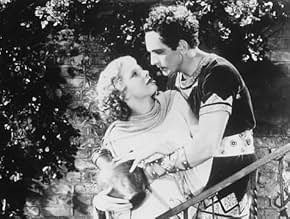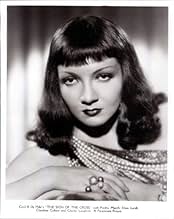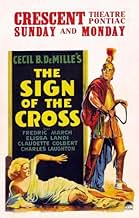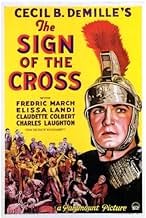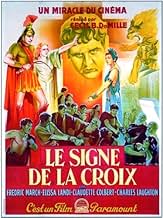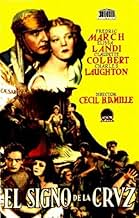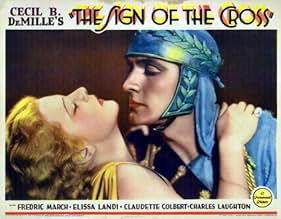IMDb RATING
6.8/10
2.8K
YOUR RATING
A Roman soldier becomes torn between his love for a Christian woman and his loyalty to Emperor Nero.A Roman soldier becomes torn between his love for a Christian woman and his loyalty to Emperor Nero.A Roman soldier becomes torn between his love for a Christian woman and his loyalty to Emperor Nero.
- Nominated for 1 Oscar
- 2 wins & 1 nomination total
Joyzelle Joyner
- Ancaria
- (as Joyzelle)
Robert Seiter
- Philodemus
- (as Robert Manning)
Storyline
Did you know
- TriviaCecil B. DeMille was pressured to drop Ancaria's seductive dance in the orgy scene by Will H. Hays of the Hays Office, but DeMille adamantly refused. Still, censors often cut out gruesome parts of the film, particularly, the cart carrying dead bodies out of the arena, a gorilla dancing around a semi-nude girl, elephants stomping Christians and picking them up with their tusks, crocodiles about to eat a bound girl, etc. These scenes are all in the restored version.
- GoofsIn the Coliseum, we see a woman tied up and is at the mercy of a gorilla. Europeans had no knowledge of gorillas' existence until more than 15 centuries later.
- Alternate versionsRe-released in 1944, with some cuts (sex and sadism scenes) and preceded by a nine minute prologue, set in present time with a WWII theme. This re-release version runs 118 minutes.
- ConnectionsEdited into Through the Centuries (1933)
- SoundtracksChristian Hymn No.1
(1932) (uncredited)
Music and Lyrics by Rudolph G. Kopp
Sung a cappella by Christians at the meeting
Reprised by them after their capture and at the arena
Sung a cappella by Elissa Landi and Tommy Conlon
Played and sung offscreen at the end
Featured review
Rome - First Century A. D. Nero, the mad Emperor & Poppaea, his vile Empress, engage in every sort of vice & degradation. Wanton cruelty becomes a spectator sport and virtue & innocence are denigrated. Slowly, however, a new Power is growing. People calling themselves Christians are secretly spreading their Faith ever more widely. They are horribly persecuted, but they continue to multiply. Which will eventually triumph - the might of Imperial Rome, or the gentle ones who follow THE SIGN OF THE CROSS?
This Cecil B. DeMille epic is a vivid retelling of the struggles of the first Christians. Paramount gave the film a lavish production and DeMille wrings every drop of piety & puerile interest possible from the plot. Fredric March is stalwart as the Roman official who falls in love with a beautiful Christian girl. While his ultimate conversion wouldn't convince the average modern Baptist, he holds his own in scenes with other performers whom are allowed to behave outrageously. Elissa Landi is sweet as the virtuous Believer, effectively underplaying her role.
`Do you want to play the most wicked woman in the world?' DeMille asked Claudette Colbert one day on the studio lot. She did & she does memorably, from her eye-popping milk bath scene to her revenge on her would-be lover. Sniveling, whining and wearing a huge fake nose, Charles Laughton is pure effeminate evil as Nero (notice his catamite), a foul blot on the face of humanity & stealing all his scenes from everyone else. History tells us that Nero eventually murdered Poppaea by stomping her to death...
Ian Keith is enjoyable as an unpunished villain. Ferdinand Gottshalk & Vivian Tobin are effectively degraded as Roman bacchants. Film mavens will recognize the voice of John Carradine, calling `We who are about to die, salute you!' out of the arena to Nero; he can later be spotted in the role of a Christian martyr ascending the dungeon stairs to his death.
DeMille had just returned to Paramount from a 3-year, 3-picture stint at MGM, where he was remarkably subdued. Back at his home studio he was allowed more license. Wrapping a little sermon up in a lot of sin, he filled this pre-Production Code drama with plenty of the latter. When THE SIGN OF THE CROSS was re-released in 1944, many cuts had to be made. The film now having been restored, it's not difficult to guess which sections those were. The Dance of the Naked Moon & much of the antics in the final arena sequence are beyond the bounds of good taste, but certainly not beyond the bounds of Cecil B. DeMille.
This Cecil B. DeMille epic is a vivid retelling of the struggles of the first Christians. Paramount gave the film a lavish production and DeMille wrings every drop of piety & puerile interest possible from the plot. Fredric March is stalwart as the Roman official who falls in love with a beautiful Christian girl. While his ultimate conversion wouldn't convince the average modern Baptist, he holds his own in scenes with other performers whom are allowed to behave outrageously. Elissa Landi is sweet as the virtuous Believer, effectively underplaying her role.
`Do you want to play the most wicked woman in the world?' DeMille asked Claudette Colbert one day on the studio lot. She did & she does memorably, from her eye-popping milk bath scene to her revenge on her would-be lover. Sniveling, whining and wearing a huge fake nose, Charles Laughton is pure effeminate evil as Nero (notice his catamite), a foul blot on the face of humanity & stealing all his scenes from everyone else. History tells us that Nero eventually murdered Poppaea by stomping her to death...
Ian Keith is enjoyable as an unpunished villain. Ferdinand Gottshalk & Vivian Tobin are effectively degraded as Roman bacchants. Film mavens will recognize the voice of John Carradine, calling `We who are about to die, salute you!' out of the arena to Nero; he can later be spotted in the role of a Christian martyr ascending the dungeon stairs to his death.
DeMille had just returned to Paramount from a 3-year, 3-picture stint at MGM, where he was remarkably subdued. Back at his home studio he was allowed more license. Wrapping a little sermon up in a lot of sin, he filled this pre-Production Code drama with plenty of the latter. When THE SIGN OF THE CROSS was re-released in 1944, many cuts had to be made. The film now having been restored, it's not difficult to guess which sections those were. The Dance of the Naked Moon & much of the antics in the final arena sequence are beyond the bounds of good taste, but certainly not beyond the bounds of Cecil B. DeMille.
- Ron Oliver
- Mar 7, 2000
- Permalink
- How long is The Sign of the Cross?Powered by Alexa
Details
Box office
- Gross US & Canada
- $5,971,004
- Runtime2 hours 5 minutes
- Color
- Aspect ratio
- 1.37 : 1
Contribute to this page
Suggest an edit or add missing content


